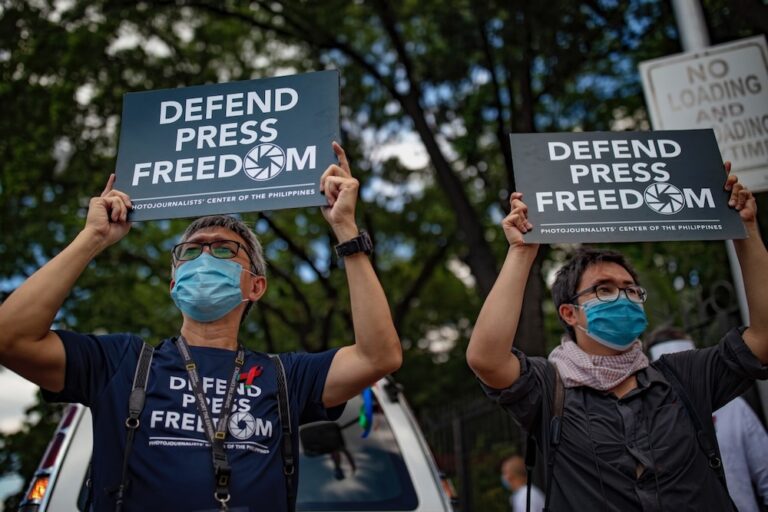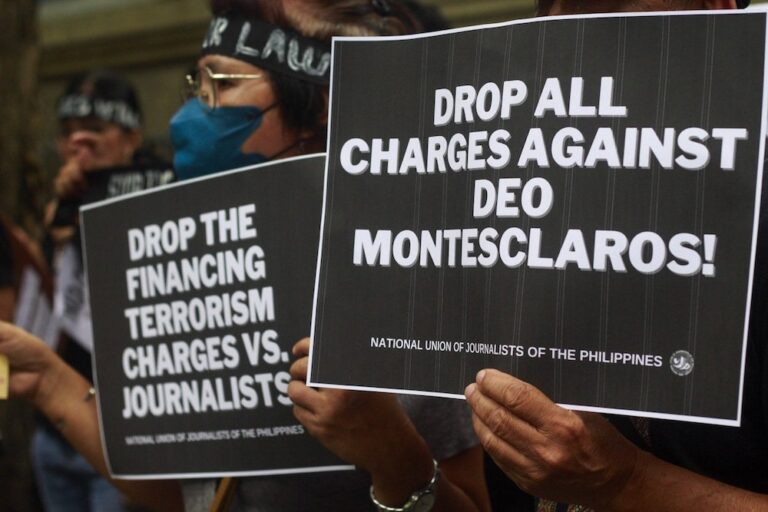(CMFR/IFEX) – Former president Joseph Estrada has ordered his lawyers to file a P100 million (approx. US$1.9 million) libel suit against Military Intelligence Chief Col. Victor Corpus and the “Philippine Daily Inquirer” on Monday 13 August at the earliest. Allegations that Estrada and Senator Panfilo Lacson, former Philippine National Police chief and ally of Estrada, […]
(CMFR/IFEX) – Former president Joseph Estrada has ordered his lawyers to file a P100 million (approx. US$1.9 million) libel suit against Military Intelligence Chief Col. Victor Corpus and the “Philippine Daily Inquirer” on Monday 13 August at the earliest.
Allegations that Estrada and Senator Panfilo Lacson, former Philippine National Police chief and ally of Estrada, have joint bank accounts in the United States containing millions of dollars prompted the decision. Corpus claims that the money came from drug deals, kidnap-for-ransom and other criminal activities. Estrada has denied the charges.
According to newspaper reports, on 10 August, Estrada, currently jailed on plunder charges, asked the Sandiganbayan graft court for permission to leave his cell to personally file his case before the city prosecutor’s office. The Sandiganbayan is the court which tries the cases of public officials.
Background Information
Estrada filed a P101 million libel (approx. US$1.95 million) case against the Gokongwei-owned “Manila Times” on 9 March 1999 (see IFEX alerts of 13 April and 24 March 1999). The libel suit came after the “Times” published a story about a controversial government contract awarded to the Argentine firm IMPSA, the signing of which the then president witnessed. The story labeled him the “unwitting ninong” (godfather) of the deal. (“Palace in P17-B contract rigging President was unwitting ‘ninong'” (subhead in italics), “Manila Times”, 16 February 1999.)
Estrada later dropped the suit after the Gokongweis publicly apologised twice for the “anxiety” he suffered. A crony of the then president eventually bought the newspaper from the Gokongweis that same year.
The “Inquirer” was the target of an Estrada-inspired advertising boycott by film producers and importers in July that same year (see IFEX alerts of 4 August and 22 July 1999). The advertising boycott first came to notice on 16 July when both the “Inquirer” and the “Times” reported the removal of movie ads from the “Inquirer”, which had begun as early as 10 July. The withdrawal occurred soon after an 8 July dinner meeting between Estrada and his movie producer friends.
Estrada claimed that the idea for the ad boycott was not his but was suggested by the movie producers on the night of the dinner. However, sources privy to the meeting claimed that on the contrary, it was Estrada who suggested the boycott in exchange for a reduction in the amusement taxes levied on the producers.


